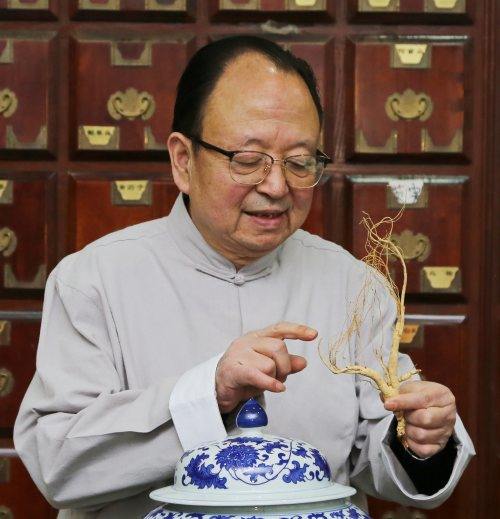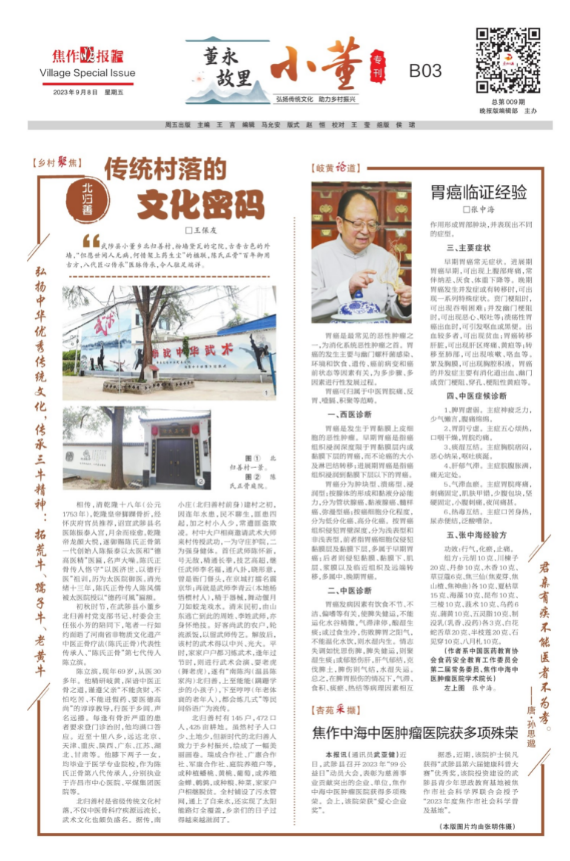Gastric cancer is one of the most common malignant tumors and the first malignant tumor of digestive system. The occurrence of gastric cancer is mainly related to Helicobacter pylori infection, environment and diet, heredity, precancerous lesions and precancerous state and other factors.
Gastric cancer can be classified into the categories of epigastric pain, nausea, choking, accumulation and so on.1. Western medicine diagnosis.Gastric cancer is a malignant tumor that occurs in the epithelial cells of the gastric mucosa. Early gastric cancer refers to gastric cancer in which the depth of invasion is limited to the gastric mucosa or submucosa, regardless of the size of the cancer and lymph node metastasis. Advanced gastric cancer refers to the gastric cancer in which the cancer tissue infiltrates below the submucosa.Gastric cancer is divided into mass type, ulcerative type and infiltrative type; according to the formation of glands and mucus secretion ability, gastric cancer is divided into tubular adenocarcinoma, mucinous adenocarcinoma, medullary carcinoma and diffuse carcinoma; according to the degree of differentiation of cancer cells, it is divided into poorly differentiated carcinoma and well differentiated carcinoma. According to the depth of gastric cancer tissue invading the gastric wall, it can be divided into superficial phenotype and non-superficial phenotype, the former refers to gastric cancer cells only invading mucous membrane and submucosa, most of them belong to early gastric cancer, while the latter invades mucosa, submucosa, muscle layer, serosa, adjacent tissues and distal metastasis, mostly middle and advanced gastric cancer.Second, diagnosis of traditional Chinese medicine.The pathogenic factors of gastric cancer are related to poor diet, uncleanliness, partial addiction, etc., which make the spleen lose its healthy movement, cannot transform the fine water grain, qi stagnation and stagnation, cause dampness and produce phlegm; or overeat and produce cold, damage the yang qi of the spleen and stomach, and cannot warm the water drink, then the water dampness endogenesis. Emotional disorders, such as worry injuring the spleen, spleen loss of health, then accumulate dampness and phlegm; or anger injury to the liver, liver qi stagnation, Kefa spleen soil, spleen injury is qi knot, water-dampness loss of transport. In short, in the case of spleen and stomach injury, Qi stagnation, food accumulation, phlegm and blood stasis, heat and other pathological factors interact to form gastric masses, and show different types of symptoms.III. Main symptoms.Early gastric cancer is often asymptomatic. In the early stage of advanced gastric cancer, there can be epigastric pain, often accompanied by poor appetite, anorexia, weight loss and so on. When complications or metastasis occur in advanced gastric cancer, a series of special symptoms may occur. Dysphagia may occur when cardiac obstruction occurs, nausea and vomiting may occur when pyloric obstruction occurs, and hematemesis or black stool can be caused when ulcerative gastric cancer bleeds. In patients with more bleeding, anemia may occur; gastric cancer may metastasize the liver, resulting in liver pain and jaundice; when transferred to the lungs, coughing and hemoptysis may occur. Pleural effusion may occur when pleura is involved. The main complications of gastric cancer are gastrointestinal bleeding, pyloric or cardiac obstruction, perforation, obstructive jaundice and so on.Diagnosis of symptoms of traditional Chinese medicine.1. Weakness of spleen and stomach. The main symptom is fatigue, less gas and lazy speech, and continuous abdominal pain.2. Stomach yin deficiency. The main symptoms are fidgeting heat, dry oropharynx and epigastric burning pain.3. Phlegm and dampness are intertwined. The main symptoms are stuffy chest, nausea, vomiting and sputum.4. Liver depression and qi stagnation. The main symptoms of epigastric abdominal distension, pain has no fixed place.5. Qi stagnation and blood stasis. The main symptoms are epigastric pain, tingling fixation, skin nail error, less abdominal mass, hard fixation, lower abdominal tingling, and night pain.6. The interaction of heat and toxin. The main symptoms are bitter mouth, hot body, red stool in urine and noisy pantothenic acid.Zhang Zhonghai experienced Fang.Efficacy: invigorate qi, remove blood stasis and relieve pain.Prescription: 10 grams of Yuanhu, 20 grams of toosendan seed, 10 grams of Salvia miltiorrhiza, 10 grams of wood incense, 6 grams of cardamom, 10 grams of Jiao Sanxian (burnt malt, burnt Hawthorn, Jiao Shenqu), 15 grams of Prunella vulgaris, 10 grams of seaweed, 10 grams of Kunbu, 10 grams of Rhizoma Zedoariae, 6 grams of black medicine, 10 grams of Puhuang, 10 grams of Wuling fat, 3 grams of myrrh (frankincense, myrrh), 20 grams of Hedyotis diffusa, 20 grams of Scutellaria barbata, 10 grams of stone see wear 10 grams, 10 grams of Zazha in August.(the writer is the second standing member of the Food and Drug Safety Education Committee of the China Medical Education Association and the academic dean of Jiaozuo Zhonghai traditional Chinese Medicine Cancer Hospital)


